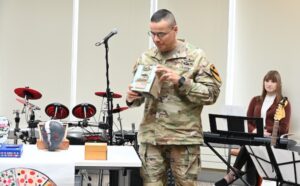FORT CAVAZOS, Texas – The Fort Cavazos Intrepid Spirit Center’s six-week Intensive Outpatient Program combines art, music, and group sessions that are all designed to help Service Members heal from events that may have caused brain injuries, long term affects from them and traumatic experiences throughout their Army careers.
The program includes stress management, PTSD, sleep, physical, mindfulness, art, music, and cognitive rehabilitation therapies.
“I’m very appreciative for the opportunity to be able to go through the program and pick up everything that you all offered, said Sgt. Maj. Daniel Reed. “Y’all made it very easy to want to participate in the process by bringing energy into the classes and making it very enjoyable.”
Soldiers that are treated for Traumatic Brain Injuries at the primary care level that do not heal after 30-45 days receive a specialty care referral to the ISC that is reviewed by staff to determine if they meet the criteria for specialty care. If accepted, they begin the process of moving into the ISC and determining what they need to be able to recover.
According to Dr. Scot Engel, director, ISC, Fort Cavazos, over the course of the programs almost seven years many service members with fifteen, eighteen, and twenty-two years of service with three, five, and six deployments through combat zones have not come forward to receive the help they need earlier in their careers, and if they need care there is a lot that they have carried over these years that needs to be unpacked.
“We’ve developed a program that is holistic, interdisciplinary and it treats the whole person, emotionally, psychologically, spiritually, and physically, and it helps reinforce the caregivers of these warriors, who are also impacted by the consequences of war as well,” Engel said.
Christopher Brown, deputy director and TBI program manager, ISC, Fort Cavazos, recently joined the team.
A former Soldier and registered nurse for nearly thirty years, Brown helps lead the Soldiers through different groups during their daily sessions.
“Every day we start with a goals group and spend thirty minutes of what we call hunting the good stuff, in which we say something positive that’s going on or happened to you today so far or since the last time we met, something positive, no matter how minuscule it is,” said Brown.
That process helped a recent group of Soldiers complete the IOP and form a special bond that may keep them close throughout the rest of their military careers and lives.
“The biggest thing for me was that at no point did I feel like I was a patient here,” said Master Sgt. Jose Rendon. “It was like I jumped into a small family that was trying to help me get reconnected with my family, which was like a huge thing, and I really do appreciate all of the help from all of you.”
“Thanks for being there for me,” he added.
Experiencing the IOP whole six-week process for the first time was special for Brown.
He explained how he watched the Soldiers, who had their own individual issues, didn’t know each other and were trying to focus on their own traumas, submerge into one group and become not just teammates in the classroom but friends and battle buddies outside the classroom.
“These guys went bowling together at lunch, unprompted by us, established chat threads to communicate to each other during the week and checked up on each other, so to see that happen was amazing,” Brown said.
The DOD’s Comprehensive Strategy for Warfighter Brain Health optimizes brain health and combats TBI by addressing multiple concerns, such as potentially hazardous events that expose the brain to potential injuries, including impacts, blows, or jolts to the head that may result in long-term effects of TBIs.
TBIs can increase the risk for mental health conditions, such as anxiety and depression, as well as sleeping problems.
“It’s important the Soldiers understand that it doesn’t matter if we call if PTSD, TBI, it’s a consequence of war and there is a metaphoric enemy within that has an end state objective, which is to isolate them, marginalize them, stigmatize them, and in hope that they will take their own life,” said Engel. “Our job is to make sure that we paint that picture and understand where the new battle space is.”
The new battle space is being able to connect with your spouse, being able to enjoy your children, being able to get out into the community and have a sense of meaning, purpose and enjoying life and ultimately that they are not broken, defective or inadequate, he added.

